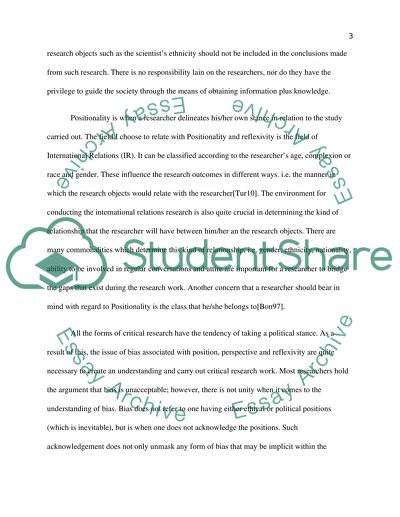Cite this document
(“How might a researchers position shape the processes and outcomes of Essay”, n.d.)
How might a researchers position shape the processes and outcomes of Essay. Retrieved from https://studentshare.org/environmental-studies/1638119-how-might-a-researchers-position-shape-the-processes-and-outcomes-of-their-research-use-an-example-from-your-own-disciplineprogramme-to-illustrate-your-answer-is-reflexivity-a-sufficient-protection-against-the-risks-of-positionality
How might a researchers position shape the processes and outcomes of Essay. Retrieved from https://studentshare.org/environmental-studies/1638119-how-might-a-researchers-position-shape-the-processes-and-outcomes-of-their-research-use-an-example-from-your-own-disciplineprogramme-to-illustrate-your-answer-is-reflexivity-a-sufficient-protection-against-the-risks-of-positionality
(How Might a Researchers Position Shape the Processes and Outcomes of Essay)
How Might a Researchers Position Shape the Processes and Outcomes of Essay. https://studentshare.org/environmental-studies/1638119-how-might-a-researchers-position-shape-the-processes-and-outcomes-of-their-research-use-an-example-from-your-own-disciplineprogramme-to-illustrate-your-answer-is-reflexivity-a-sufficient-protection-against-the-risks-of-positionality.
How Might a Researchers Position Shape the Processes and Outcomes of Essay. https://studentshare.org/environmental-studies/1638119-how-might-a-researchers-position-shape-the-processes-and-outcomes-of-their-research-use-an-example-from-your-own-disciplineprogramme-to-illustrate-your-answer-is-reflexivity-a-sufficient-protection-against-the-risks-of-positionality.
“How Might a Researchers Position Shape the Processes and Outcomes of Essay”, n.d. https://studentshare.org/environmental-studies/1638119-how-might-a-researchers-position-shape-the-processes-and-outcomes-of-their-research-use-an-example-from-your-own-disciplineprogramme-to-illustrate-your-answer-is-reflexivity-a-sufficient-protection-against-the-risks-of-positionality.


